自考英语(二)上册课文中英文对照翻译
山东自考英语二课文翻译
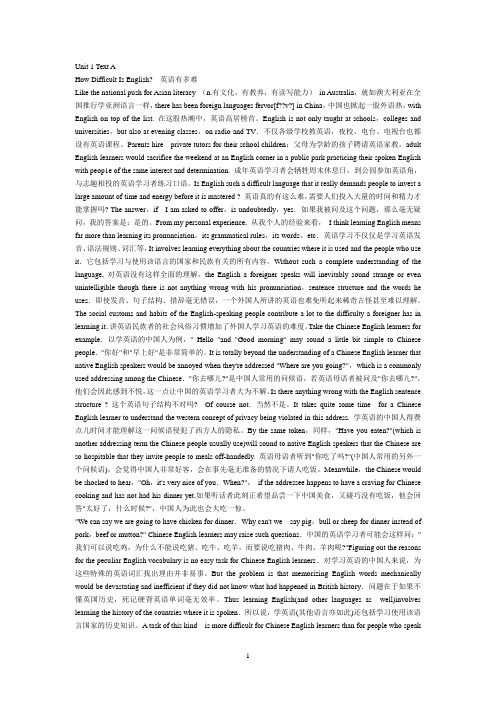
Unit 1 Text AHow Difficult Is English? 英语有多难Like the national push for Asian literacy (n.有文化,有教养,有读写能力)in Australia,就如澳大利亚在全国推行学亚洲语言一样,there has been foreign languages fervor[f??v?] in China,中国也掀起一股外语热,with English on top of the list. 在这股热潮中,英语高居榜首。
English is not only taught at schools,colleges and universities,but also at evening classes,on radio and TV.不仅各级学校教英语,夜校、电台、电视台也都设有英语课程。
Parents hire private tutors for their school children;父母为学龄的孩子聘请英语家教,adult English learners would sacrifice the weekend at an English corner in a public park practicing their spoken English with peop1e of the same interest and determination. 成年英语学习者会牺牲周末休息日,到公园参加英语角,与志趣相投的英语学习者练习口语。
Is English such a difficult language that it really demands people to invest a large amount of time and energy before it is mastered ? 英语真的有这么难,需要人们投入大量的时间和精力才能掌握吗? The answer,if I am asked to offer,is undoubtedly,yes.如果我被问及这个问题,那么毫无疑问,我的答案是:是的。
山东自考英语二课文原文及翻译(精选)

山东自考本科英语二课本原文及翻译Unit 1 Text AHow Difficult Is English? 英语有多难Like the national push for Asian literacy (n.有文化,有教养,有读写能力)in Australia,there has been foreign languages fervor in China,with English on top of the list.就如澳大利亚在全国推行学亚洲语言一样,中国也掀起一股外语热,在这股热潮中,英语高居榜首。
English is not only taught at schools,colleges and universities,but also at evening classes,on radio and TV.不仅各级学校教英语,夜校、电台、电视台也都设有英语课程。
Parents hire private tutors for their school children;adult English learners would sacrifice the weekend at an English corner in a public park practicing their spoken English with peop1e of the same interest and determination.父母为学龄的孩子聘请英语家教,成年英语学习者会牺牲周末休息日,到公园参加英语角,与志趣相投的英语学习者练习口语。
Is English such a difficult language that it really demands people to invest a large amount of time and energy before it is mastered ?英语真的有这么难,需要人们投入大量的时间和精力才能掌握吗?The answer,if I am asked to offer,is undoubtedly,yes.如果我被问及这个问题,那么毫无疑问,我的答案是:是的。
[整理版]自考英语二上册课文翻译
![[整理版]自考英语二上册课文翻译](https://img.taocdn.com/s3/m/77e0dcedda38376baf1faea4.png)
Unit,,,,,1,,,,,,,,,,Text,,,,,A,,,,,,,,,,怎样成为一名成功的语言学习者“学习一门语言很容易,即使小孩也能做得到。
”大多数正在学习第二语言的成年人会不同意这种说法。
对他们来说,学习一门语言是非常困难的事情。
他们需要数百小时的学习与练习,即使这样也不能保证每个成年语言学习者都能学好。
语言学习不同于其他学习。
许多人很聪明,在自己的领域很成功,但他们发现很难学好一门语言。
相反,一些人学习语言很成功,但却发现很难在其他领域有所成就。
语言教师常常向语言学习者提出建议:“要用新的语言尽量多阅读”,“每天练习说这种语言”,“与说这种语言的人住在一起”,“不要翻译——尽量用这种新的语言去思考”,“要像孩子学语言一样去学习新语言”,“放松地去学习语言。
”然而,成功的语言学习者是怎样做的呢,,,,,语言学习研究表明,成功的语言学习者在许多方面都有相似之处。
首先,成功的语言学习者独立学习。
他们不依赖书本和老师,而且能找到自己学习语言的方法。
他们不是等待老师来解释,而是自己尽力去找到语言的句式和规则。
他们寻找线索并由自己得出结论,从而做出正确的猜测。
如果猜错,他们就再猜一遍。
他们都努力从错误中学习。
成功的语言学习是一种主动的学习。
因此,成功的语言学习者不是坐等时机而是主动寻找机会来使用语言。
他们找到(说)这种语言的人进行练习,出错时请这些人纠正。
他们不失时机地进行交流,不怕重复所听到的话,也不怕说出离奇的话,他们不在乎出错,并乐于反复尝试。
当交流困难时,他们可以接受不确切或不完整的。
对他们来说,更重要的是学习用这种语言思考,而不是知道每个词的意思。
最后,成功的语言学习者学习目的明确。
他们想学习一门语言是因为他们对这门语言以及说这种语言的人感兴趣。
他们有必要学习这门语言去和那些人交流并向他们学习。
他们发现经常练习使用这种语言很容易,因为他们想利用这种语言来学习。
你是什么样的语言学习者,,,,,如果你是一位成功的语言学习者,那么你大概一直在独立地,主动地,目的明确地学习。
新版自考英语(二)课文及翻译atributetothedog

Unit 3 Text BA Tribute to the Dog狗的赞歌The best friend a man has in this world may turn against him and become his enemy. His son or daughter whom he has reared with loving care may prove ungrateful. Those who are nearest and dearest to us, those whom we trust with our happiness and our good name, may become traitors to their faith.一个人在世上最好的朋友可能背叛他,变成他的敌人。
他精心养育的儿女可能会忘恩负义。
那些和我们最亲近的人,那些我们信任,将自己的幸福和名誉托付给他们的人也许会背信弃义。
The money that a man has he may lose. It flies away from him, perhaps when he needs it most. A man's reputation may be sacrificed in a moment of ill-considered action. The people who are prone to fall on their knees to do us honor when success is with us may be the first to throw the stone of malice when failure settles its cloud upon our head s. The one absolutely, unselfish friend a man may have in this selfish world, the one that never deserts him, the one that never proves ungrateful or treacherous, is his dog.一个人拥有的钱财可能会失去。
自考综合英语二上册02课单词中英文释义表格.doc

distinguish
V
|vn| (not used in the progressive tenses) distinguish A (from B) to be a characteristic that makes two people, animals or things difference另ij于; 使显苦
n
1.a person who competes in spons:运动员
2.(BrE) a person who competes in sports such as running and jumping田径运动员
3.a person who is good at sports and physical exercise:扌讯长运动的人
media
n
1.the media |U+sing./pl. v. | the main ways that large numbers of people receive information and entertainment, that is television, radio, newspapers and the Internet:宣传工具,新闻媒介
comic
adj
1.amusing and making you laugh:逗笑(l勺;
2.(only before nounl connected with comedy (= eniertainmenl that is funny and that makes people laugh):喜剧的
heroine
n
1.a girl or woman who is admired by many for doing sth brave or good:女英雄;
自考综合英语二(上册)课文翻译与详细讲解
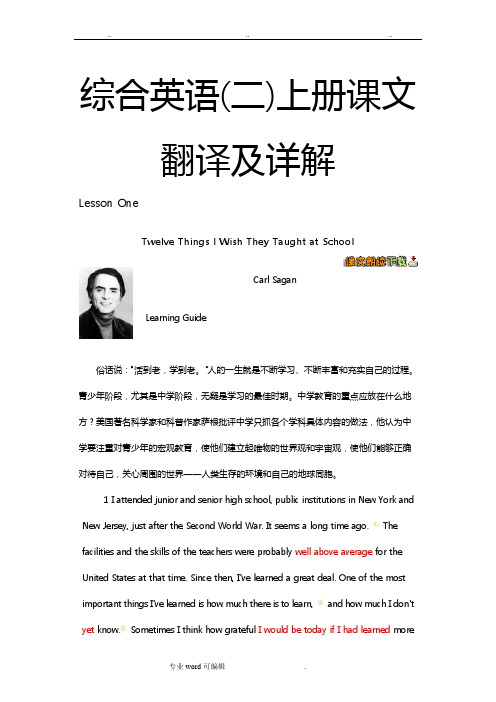
综合英语(二)上册课文翻译及详解Lesson OneTwelve Things l Wish They Taught at SchoolCarl SaganLearning Guide俗话说:“活到老,学到老。
”人的一生就是不断学习、不断丰富和充实自己的过程。
青少年阶段,尤其是中学阶段,无疑是学习的最佳时期。
中学教育的重点应放在什么地方?美国著名科学家和科普作家萨根批评中学只抓各个学科具体内容的做法,他认为中学要注重对青少年的宏观教育,使他们建立起唯物的世界观和宇宙观,使他们能够正确对待自己,关心周围的世界——人类生存的环境和自己的地球同胞。
1 I attended junior and senior high school, public institutions in New York and New Jersey, just after the Second World War. It seems a long time ago. ①The facilities and the skills of the teachers were probably well above average for the United States at that time.Since then, I've learned a great deal. One of the most important things I've learned is how much there is to learn, ②and how much I don't yet know.③Sometimes I think how grateful I would be today if I had learned moreback then about what really matters. In some respects that education was terribly narrow; the only thing I ever heard in school about Napoleon was that the United States made the Louisiana Purchase from him. ④(On a planet where some 95% of the inhabitants are not Americans, the only history that was thought worth teaching was American history. ) In spelling, grammar, the fundamenta ls of math, and other vital subjects, my teachers did a pretty good job. But there's so much else I wish they'd taught us.①The facilities and skills of the teachers were probably well above average for the United States at that time.学校的设施、教师的水平在当时的美国大大高于一般的水平。
自考综合英语二上册课后翻译

综合英语二上册——课后翻译lesson oneTranslate the following into English.1) Use the verb + noun collocation.出席会议 to attend a meeting 干的不错 to do a good job体验苦难 to experience bitterness 自学英语 to teach oneself English发现奇迹 to discover wonders 忍住咳嗽to hold back one’s cough掌握技能 to master skills 获取知识 to acquire knowledge需要勇气 to require courage 丰富生活to enrich one’s life接受修正 to accept rectification 改正错误 to correct mistakes不再指望 to cherish no hope 作出努力 to make efforts2)Use the “useful expressions”.1.新造的大桥坍塌了,一名工程师和两名地方官员为此受到刑事起诉。
The collapse of the big newly-built bridge led to criminal prosecution against an engineer and two local government officials.2.他工作了一天,午饭都没动。
He worked all day, leaving his lunch untouched.3.经常性的体育运动使学生身体强壮,更好的适应学习,决不是浪费时间。
Far from being a waste of time, regular sports activities make students physica lly strong and deal with their study better.4.在海洋世界公园,海豹和海豚能够表演各种技巧,逗的小观众们乐不可支。
自考英语(二)上册课文中英文对照翻译
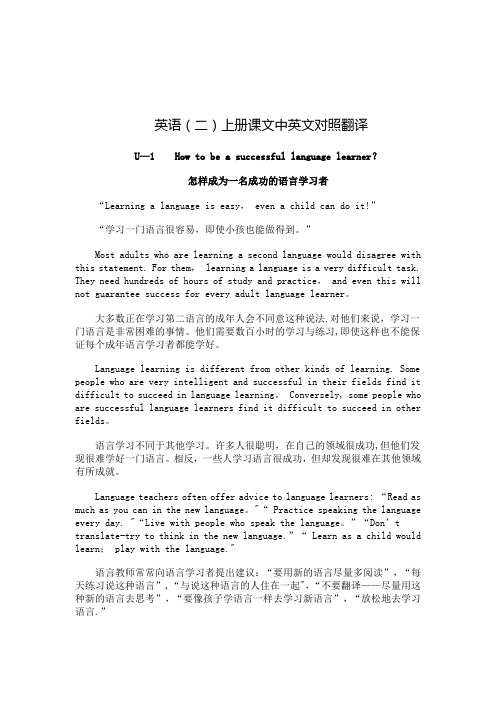
英语(二)上册课文中英文对照翻译U—1 How to be a successful language learner?怎样成为一名成功的语言学习者“Learning a language is easy,even a child can do it!”“学习一门语言很容易,即使小孩也能做得到。
”Most adults who are learning a second language would disagree with this statement. For them, learning a language is a very difficult task. They need hundreds of hours of study and practice, and even this will not guarantee success for every adult language learner。
大多数正在学习第二语言的成年人会不同意这种说法.对他们来说,学习一门语言是非常困难的事情。
他们需要数百小时的学习与练习,即使这样也不能保证每个成年语言学习者都能学好。
Language learning is different from other kinds of learning. Some people who are very intelligent and successful in their fields find it difficult to succeed in language learning。
Conversely, some people who are successful language learners find it difficult to succeed in other fields。
语言学习不同于其他学习。
许多人很聪明,在自己的领域很成功,但他们发现很难学好一门语言。
新版自考英语(二)课文及翻译A Tribute to the Dog
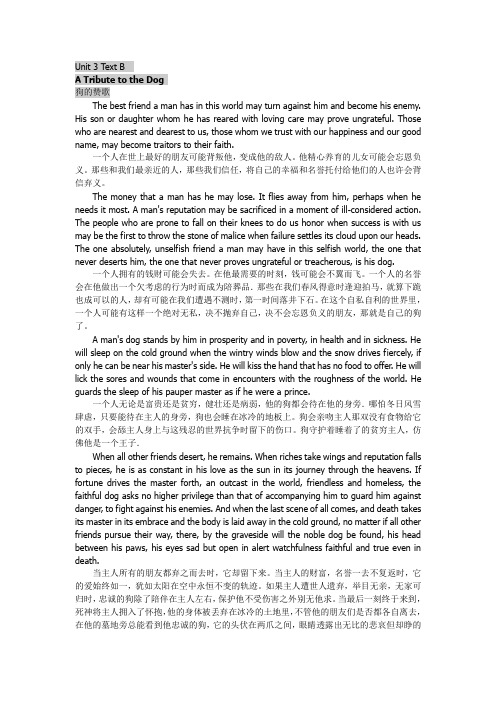
Unit 3 Text BA Tribute to the Dog狗的赞歌The best friend a man has in this world may turn against him and become his enemy. His son or daughter whom he has reared with loving care may prove ungrateful. Those who are nearest and dearest to us, those whom we trust with our happiness and our good name, may become traitors to their faith.一个人在世上最好的朋友可能背叛他,变成他的敌人。
他精心养育的儿女可能会忘恩负义。
那些和我们最亲近的人,那些我们信任,将自己的幸福和名誉托付给他们的人也许会背信弃义。
The money that a man has he may lose. It flies away from him, perhaps when he needs it most. A man's reputation may be sacrificed in a moment of ill-considered action. The people who are prone to fall on their knees to do us honor when success is with us may be the first to throw the stone of malice when failure settles its cloud upon our heads. The one absolutely, unselfish friend a man may have in this selfish world, the one that never deserts him, the one that never proves ungrateful or treacherous, is his dog.一个人拥有的钱财可能会失去。
自考英语(二)教材课文翻译
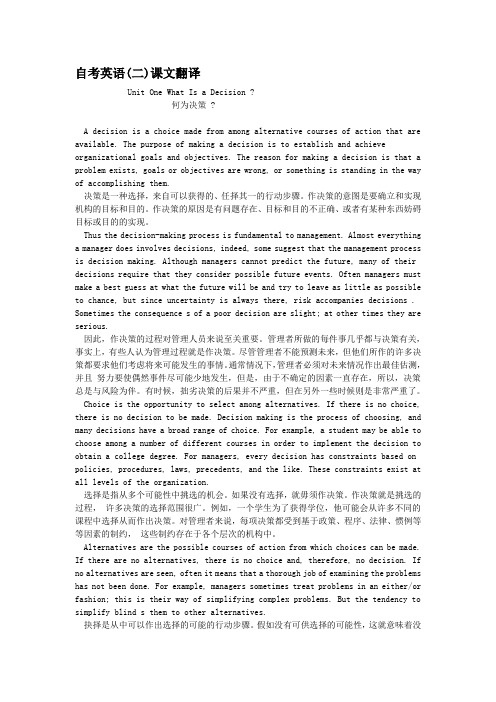
自考英语(二)课文翻译Unit One What Is a Decision ?何为决策 ?A decision is a choice made from among alternative courses of action that are available. The purpose of making a decision is to establish and achieve organizational goals and objectives. The reason for making a decision is that a problem exists, goals or objectives are wrong, or something is standing in the way of accomplishing them.决策是一种选择,来自可以获得的、任择其一的行动步骤。
作决策的意图是要确立和实现机构的目标和目的。
作决策的原因是有问题存在、目标和目的不正确、或者有某种东西妨碍目标或目的的实现。
Thus the decision-making process is fundamental to management. Almost everything a manager does involves decisions, indeed, some suggest that the management process is decision making. Although managers cannot predict the future, many of their decisions require that they consider possible future events. Often managers must make a best guess at what the future will be and try to leave as little as possible to chance, but since uncertainty is always there, risk accompanies decisions . Sometimes the consequence s of a poor decision are slight; at other times they are serious.因此,作决策的过程对管理人员来说至关重要。
2021版自考英语二课文中英文对照
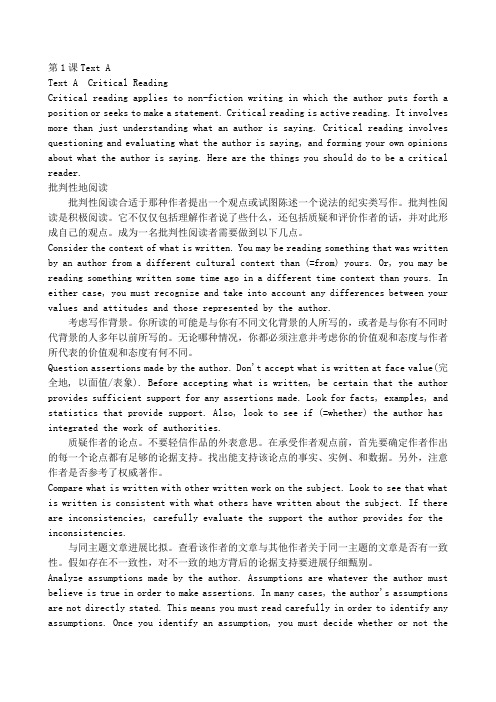
第1课Text AText A Critical ReadingCritical reading applies to non-fiction writing in which the author puts forth a position or seeks to make a statement. Critical reading is active reading. It involves more than just understanding what an author is saying. Critical reading involves questioning and evaluating what the author is saying, and forming your own opinions about what the author is saying. Here are the things you should do to be a critical reader.批判性地阅读批判性阅读合适于那种作者提出一个观点或试图陈述一个说法的纪实类写作。
批判性阅读是积极阅读。
它不仅仅包括理解作者说了些什么,还包括质疑和评价作者的话,并对此形成自己的观点。
成为一名批判性阅读者需要做到以下几点。
Consider the context of what is written. You may be reading something that was written by an author from a different cultural context than (=from) yours. Or, you may be reading something written some time ago in a different time context than yours. In either case, you must recognize and take into account any differences between your values and attitudes and those represented by the author.考虑写作背景。
自考英语二Unit-1--The-Power-of-Language--翻译
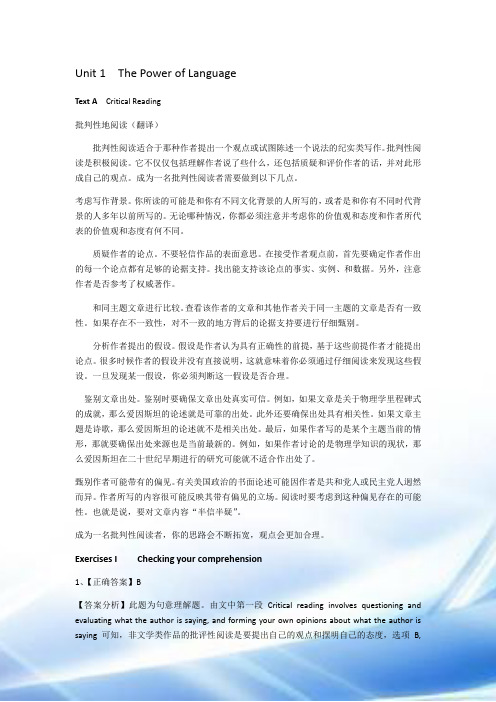
Unit 1 The Power of LanguageText A Critical Reading批判性地阅读(翻译)批判性阅读适合于那种作者提出一个观点或试图陈述一个说法的纪实类写作。
批判性阅读是积极阅读。
它不仅仅包括理解作者说了些什么,还包括质疑和评价作者的话,并对此形成自己的观点。
成为一名批判性阅读者需要做到以下几点。
考虑写作背景。
你所读的可能是和你有不同文化背景的人所写的,或者是和你有不同时代背景的人多年以前所写的。
无论哪种情况,你都必须注意并考虑你的价值观和态度和作者所代表的价值观和态度有何不同。
质疑作者的论点。
不要轻信作品的表面意思。
在接受作者观点前,首先要确定作者作出的每一个论点都有足够的论据支持。
找出能支持该论点的事实、实例、和数据。
另外,注意作者是否参考了权威著作。
和同主题文章进行比较。
查看该作者的文章和其他作者关于同一主题的文章是否有一致性。
如果存在不一致性,对不一致的地方背后的论据支持要进行仔细甄别。
分析作者提出的假设。
假设是作者认为具有正确性的前提,基于这些前提作者才能提出论点。
很多时候作者的假设并没有直接说明,这就意味着你必须通过仔细阅读来发现这些假设。
一旦发现某一假设,你必须判断这一假设是否合理。
鉴别文章出处。
鉴别时要确保文章出处真实可信。
例如,如果文章是关于物理学里程碑式的成就,那么爱因斯坦的论述就是可靠的出处。
此外还要确保出处具有相关性。
如果文章主题是诗歌,那么爱因斯坦的论述就不是相关出处。
最后,如果作者写的是某个主题当前的情形,那就要确保出处来源也是当前最新的。
例如,如果作者讨论的是物理学知识的现状,那么爱因斯坦在二十世纪早期进行的研究可能就不适合作出处了。
甄别作者可能带有的偏见。
有关美国政治的书面论述可能因作者是共和党人或民主党人迥然而异。
作者所写的内容很可能反映其带有偏见的立场。
阅读时要考虑到这种偏见存在的可能性。
也就是说,要对文章内容“半信半疑”。
成为一名批判性阅读者,你的思路会不断拓宽,观点会更加合理。
自考 英语(二)课文翻译及练习答案

第一部分 Text A & 第二部分 Text B第一部分 Text A【课文译文】怎样成为一名成功的语言学习者决策是从可供挑选的行动方案中作出选择,目的在于确定并实现组织机构的目标或目的。
之所以要决策是因为存在问题,或是目标或目的不对,或某种东西妨碍目标或目的实现。
因此,决策过程对于管理人员非常重要。
管理者所做的一切几乎都与决策有关,事实上,有人甚至认为管理过程就是决策过程。
虽然决策者不能预测未来,但他们的许多决策要求他们必须考虑未来可能会发生的情况。
管理者必须对未来的事情作出最佳的猜测,并使偶然性尽可能少地发生。
但因为总是存在着未知情况,所以决策往往伴随着风险。
有时失误的决策带来的后果不很严重,但有时就会不堪设想。
选择就是从多种选项中进行取舍,没有选择,就没有决策。
决策本身就是一个选择的过程,许多决策有着很广的选择范围。
例如,学生为了实现自己获得学位的目标,可能会从多门课程中进行选择,对于管理者来说,每一个决策都受到政策、程序、法律、惯例等方面的制约,这些制约存在于一个组织的各个部门里。
选项就是可供选择的种种可行的行动方案。
没有选项,就没有选择,因而也就没有决策。
如果看不到任何选项,这意味着还没有对问题进行彻底的研究。
例如,管理者有时会用“非此即彼”的方式处理问题,这是他们简化问题的方法。
这种简化问题的习惯常常使他们看不到其他的选项。
在管理这个层次上,制定决策包括:识别选项和缩小选项范围,其范围小到微乎其微,大到近乎无限。
决策者必须有某种方法来断定几种选项中的最佳选项,即哪个选项最有利于实现其组织的目标。
组织的目标是指该组织努力完成或达到的目标或现状。
由于个人(或组织)对于怎样实现其目标的方式都有不同的见解,最佳的选择就在于决策者了。
常常是一个组织的下属部门做出的决策对自己有利,而对上一级的部门来说,就不是较佳选择了。
这种增加部门的局部利益而减少其他部门的局部利益所作出的权衡,叫做局部优化。
自考综合英语二 上册12课单词中英文释义表格

n
a product, usually a book, which is bought by large numbers of people:畅销书
consecutive
adj
[usually before noun] following one after another in a series, without interruption:连续不断的
adj
done very often, or existing in many places, and therefore not unusual:平凡的,老生常谈的
avid
adj
[usually before noun] very enthusiastic about sth (often a hobby) SYN keen:急切的,渴望的
numerous
adj
(formal) existing in large numbers SYN many:无数的
increasingly
adv
more and more all the time:逐渐地;逐增地
alarm
vt
to make sb anxious or afraid SYN worry:使担心,使害怕
poisonous
adj
1.causing death or illness if swallowed or absorbed into the body SYN toxic:
agency
n
a business or an organization that provides a particular service especially on behalf of other businesses or organizations:机构;代理处
自考英语二课文原文翻译汇总Unit1-Unit12
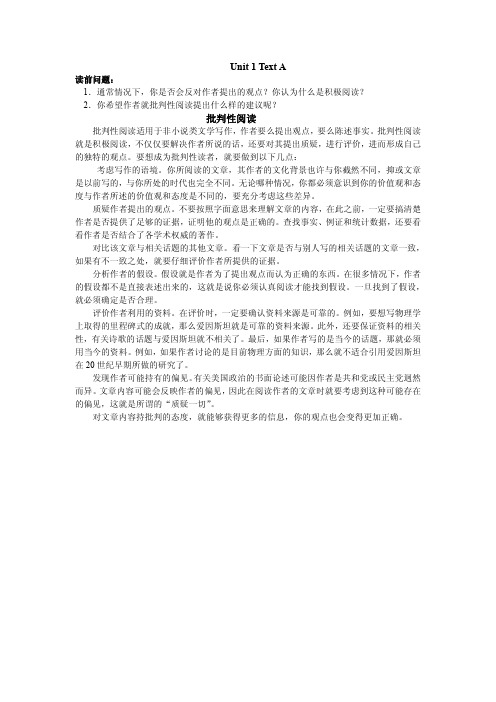
Unit1Text A读前问题:1.通常情况下,你是否会反对作者提出的观点?你认为什么是积极阅读?2.你希望作者就批判性阅读提出什么样的建议呢?批判性阅读批判性阅读适用于非小说类文学写作,作者要么提出观点,要么陈述事实。
批判性阅读就是积极阅读,不仅仅要解决作者所说的话,还要对其提出质疑,进行评价,进而形成自己的独特的观点。
要想成为批判性读者,就要做到以下几点:考虑写作的语境。
你所阅读的文章,其作者的文化背景也许与你截然不同,抑或文章是以前写的,与你所处的时代也完全不同。
无论哪种情况,你都必须意识到你的价值观和态度与作者所述的价值观和态度是不同的,要充分考虑这些差异。
质疑作者提出的观点。
不要按照字面意思来理解文章的内容,在此之前,一定要搞清楚作者是否提供了足够的证据,证明他的观点是正确的。
查找事实、例证和统计数据,还要看看作者是否结合了各学术权威的著作。
对比该文章与相关话题的其他文章。
看一下文章是否与别人写的相关话题的文章一致,如果有不一致之处,就要仔细评价作者所提供的证据。
分析作者的假设。
假设就是作者为了提出观点而认为正确的东西。
在很多情况下,作者的假设都不是直接表述出来的,这就是说你必须认真阅读才能找到假设。
一旦找到了假设,就必须确定是否合理。
评价作者利用的资料。
在评价时,一定要确认资料来源是可靠的。
例如,要想写物理学上取得的里程碑式的成就,那么爱因斯坦就是可靠的资料来源。
此外,还要保证资料的相关性,有关诗歌的话题与爱因斯坦就不相关了。
最后,如果作者写的是当今的话题,那就必须用当今的资料。
例如,如果作者讨论的是目前物理方面的知识,那么就不适合引用爱因斯坦在20世纪早期所做的研究了。
发现作者可能持有的偏见。
有关美国政治的书面论述可能因作者是共和党或民主党迥然而异。
文章内容可能会反映作者的偏见,因此在阅读作者的文章时就要考虑到这种可能存在的偏见,这就是所谓的“质疑一切”。
对文章内容持批判的态度,就能够获得更多的信息,你的观点也会变得更加正确。
自考英语二Unit 1 The Power of Language 翻译
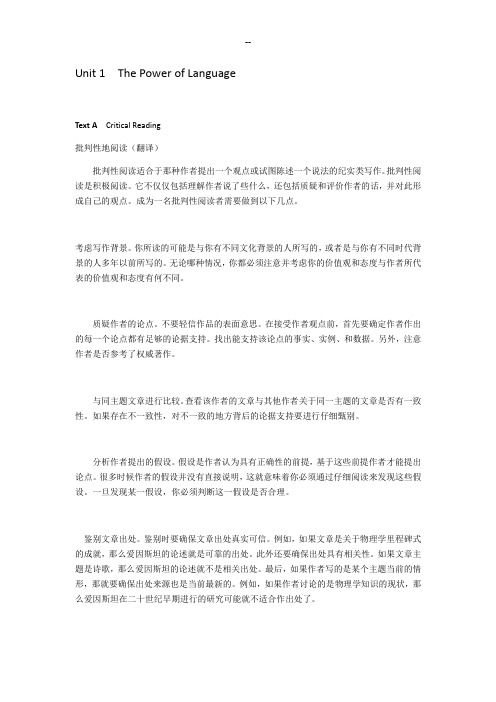
Unit 1 The Power of LanguageText A Critical Reading批判性地阅读(翻译)批判性阅读适合于那种作者提出一个观点或试图陈述一个说法的纪实类写作。
批判性阅读是积极阅读。
它不仅仅包括理解作者说了些什么,还包括质疑和评价作者的话,并对此形成自己的观点。
成为一名批判性阅读者需要做到以下几点。
考虑写作背景。
你所读的可能是与你有不同文化背景的人所写的,或者是与你有不同时代背景的人多年以前所写的。
无论哪种情况,你都必须注意并考虑你的价值观和态度与作者所代表的价值观和态度有何不同。
质疑作者的论点。
不要轻信作品的表面意思。
在接受作者观点前,首先要确定作者作出的每一个论点都有足够的论据支持。
找出能支持该论点的事实、实例、和数据。
另外,注意作者是否参考了权威著作。
与同主题文章进行比较。
查看该作者的文章与其他作者关于同一主题的文章是否有一致性。
如果存在不一致性,对不一致的地方背后的论据支持要进行仔细甄别。
分析作者提出的假设。
假设是作者认为具有正确性的前提,基于这些前提作者才能提出论点。
很多时候作者的假设并没有直接说明,这就意味着你必须通过仔细阅读来发现这些假设。
一旦发现某一假设,你必须判断这一假设是否合理。
鉴别文章出处。
鉴别时要确保文章出处真实可信。
例如,如果文章是关于物理学里程碑式的成就,那么爱因斯坦的论述就是可靠的出处。
此外还要确保出处具有相关性。
如果文章主题是诗歌,那么爱因斯坦的论述就不是相关出处。
最后,如果作者写的是某个主题当前的情形,那就要确保出处来源也是当前最新的。
例如,如果作者讨论的是物理学知识的现状,那么爱因斯坦在二十世纪早期进行的研究可能就不适合作出处了。
甄别作者可能带有的偏见。
有关美国政治的书面论述可能因作者是共和党人或民主党人迥然而异。
作者所写的内容很可能反映其带有偏见的立场。
阅读时要考虑到这种偏见存在的可能性。
也就是说,要对文章内容“半信半疑”。
成为一名批判性阅读者,你的思路会不断拓宽,观点会更加合理。
版自考英语二课文中英文对照
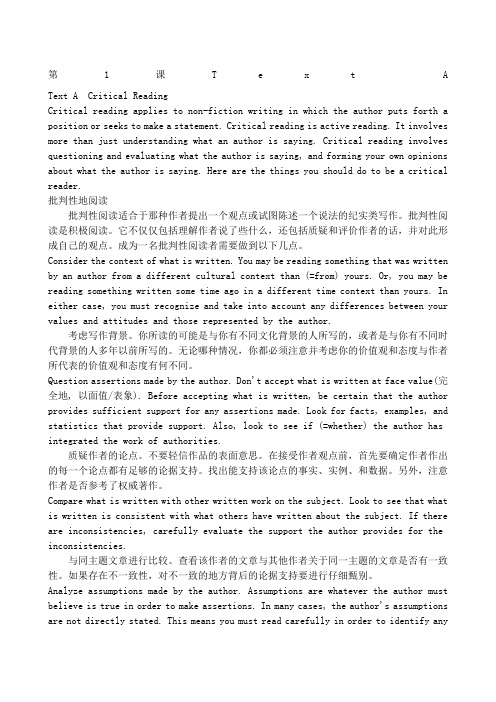
第1课T e x t AText A Critical ReadingCritical reading applies to non-fiction writing in which the author puts forth a position or seeks to make a statement. Critical reading is active reading. It involves more than just understanding what an author is saying. Critical reading involves questioning and evaluating what the author is saying, and forming your own opinions about what the author is saying. Here are the things you should do to be a critical reader.批判性地阅读批判性阅读适合于那种作者提出一个观点或试图陈述一个说法的纪实类写作。
批判性阅读是积极阅读。
它不仅仅包括理解作者说了些什么,还包括质疑和评价作者的话,并对此形成自己的观点。
成为一名批判性阅读者需要做到以下几点。
Consider the context of what is written. You may be reading something that was written by an author from a different cultural context than (=from) yours. Or, you may be reading something written some time ago in a different time context than yours. In either case, you must recognize and take into account any differences between your values and attitudes and those represented by the author.考虑写作背景。
自考英语二课文翻译

第1课Text A批判性地阅读批判性阅读适合于那种作者提出一个观点或试图陈述一个说法的纪实类写作。
批判性阅读是积极阅读。
它不仅仅包括理解作者说了些什么,还包括质疑和评价作者的话,并对此形成自己的观点。
成为一名批判性阅读者需要做到以下几点。
考虑写作背景。
你所读的可能是与你有不同文化背景的人所写的,或者是与你有不同时代背景的人多年以前所写的。
无论哪种情况,你都必须注意并考虑你的价值观和态度与作者所代表的价值观和态度有何不同。
质疑作者的论点。
不要轻信作品的表面意思。
在接受作者观点前,首先要确定作者作出的每一个论点都有足够的论据支持。
找出能支持该论点的事实、实例、和数据。
另外,注意作者是否参考了权威著作。
与同主题文章进行比较。
查看该作者的文章与其他作者关于同一主题的文章是否有一致性。
如果存在不一致性,对不一致的地方背后的论据支持要进行仔细甄别。
分析作者提出的假设。
假设是作者认为具有正确性的前提,基于这些前提作者才能提出论点。
很多时候作者的假设并没有直接说明,这就意味着你必须通过仔细阅读来发现这些假设。
一旦发现某一假设,你必须判断这一假设是否合理。
鉴别文章出处。
鉴别时要确保文章出处真实可信。
例如,如果文章是关于物理学里程碑式的成就,那么爱因斯坦的论述就是可靠的出处。
此外还要确保出处具有相关性。
如果文章主题是诗歌,那么爱因斯坦的论述就不是相关出处。
最后,如果作者写的是某个主题当前的情形,那就要确保出处来源也是当前最新的。
例如,如果作者讨论的是物理学知识的现状,那么爱因斯坦在二十世纪早期进行的研究可能就不适合作出处了。
甄别作者可能带有的偏见。
有关美国政治的书面论述可能因作者是共和党人或民主党人迥然而异。
作者所写的内容很可能反映其带有偏见的立场。
阅读时要考虑到这种偏见存在的可能性。
也就是说,要对文章内容“半信半疑”。
成为一名批判性阅读者,你的思路会不断拓宽,观点会更加合理。
第1课Text B自信的语言语言能影响我们的大脑。
- 1、下载文档前请自行甄别文档内容的完整性,平台不提供额外的编辑、内容补充、找答案等附加服务。
- 2、"仅部分预览"的文档,不可在线预览部分如存在完整性等问题,可反馈申请退款(可完整预览的文档不适用该条件!)。
- 3、如文档侵犯您的权益,请联系客服反馈,我们会尽快为您处理(人工客服工作时间:9:00-18:30)。
英语(二)上册课文中英文对照翻译U-1 How to be a successful language learner?怎样成为一名成功的语言学习者“Learning a language is easy, even a child can do it!”“学习一门语言很容易,即使小孩也能做得到。
”Most adults who are learning a second language would disagree with this statement. For them, learning a language is a very difficult task. They need hundreds of hours of study and practice, and even this will not guarantee success for every adult language learner.大多数正在学习第二语言的成年人会不同意这种说法。
对他们来说,学习一门语言是非常困难的事情。
他们需要数百小时的学习与练习,即使这样也不能保证每个成年语言学习者都能学好。
Language learning is different from other kinds of learning. Some people who are very intelligent and successful in their fields find it difficult to succeed in language learning. Conversely, some people who are successful language learners find it difficult to succeed in other fields.语言学习不同于其他学习。
许多人很聪明,在自己的领域很成功,但他们发现很难学好一门语言。
相反,一些人学习语言很成功,但却发现很难在其他领域有所成就。
Language teachers often offer advice to language learners: “Read as much as you can in the new language.”“ Practice speaking the language every day. ”“Live with people who speak the language.”“Don’t translate-try to think in the new language.”“ Learn as a child would learn; play with the language.”语言教师常常向语言学习者提出建议:“要用新的语言尽量多阅读”,“每天练习说这种语言”,“与说这种语言的人住在一起”,“不要翻译——尽量用这种新的语言去思考”,“要像孩子学语言一样去学习新语言”,“放松地去学习语言。
”But what does a successful language learner do? Language learning research shows that successful language learners are similar in many ways.然而,成功的语言学习者是怎样做的呢?语言学习研究表明,成功的语言学习者在许多方面都有相似之处。
First of all, successful language learners are independent learners. They do not depend on the book or the teacher; they discover their own way to learn the language. Instead of waiting for the teacher to explain, they try to find the patterns and the rules for themselves. They are good guessers who look for clues and form their own conclusions. When they guess wrong, they guess again. They try to learn from their mistakes.首先,成功的语言学习者独立学习。
他们不依赖书本和老师,而且能找到自己学习语言的方法。
他们不是等待老师来解释,而是自己尽力去找到语言的句式和规则。
他们寻找线索并由自己得出结论,从而做出正确的猜测。
如果猜错,他们就再猜一遍。
他们都努力从错误中学习。
Successful language learning is active learning. Therefore, successful learners do not wait for a chance to use the language; they look for such a chance. They find people who speak the language and they ask these people to correct them when they make a mistake. They will try anything to communicate. They are not afraid to repeat what they hear or to say strange things; they are willing to make mistakes and try again. When communication is difficult, they can accept information that is inexact or incomplete. It is more important for them to learn to think in the language than to know the meaning of every word.成功的语言学习是一种主动的学习。
因此,成功的语言学习者不是坐等时机而是主动寻找机会来使用语言。
他们找到(说)这种语言的人进行练习,出错时请这些人纠正。
他们不失时机地进行交流,不怕重复所听到的话,也不怕说出离奇的话,他们不在乎出错,并乐于反复尝试。
当交流困难时,他们可以接受不确切或不完整的信息。
对他们来说,更重要的是学习用这种语言思考,而不是知道每个词的意思。
Finally, successful language learners are learners with a purpose. They want to learn the language because they are interested in the language and the people who speak it. It is necessary for them to learn the language in order to communicate with these people and to learn from them. They find it easy to practice using the language regularly because they want to learn with it.最后,成功的语言学习者学习目的明确。
他们想学习一门语言是因为他们对这门语言以及说这种语言的人感兴趣。
他们有必要学习这门语言去和那些人交流并向他们学习。
他们发现经常练习使用这种语言很容易,因为他们想利用这种语言来学习。
What kind of language learner are you? If you are a successful language learner, you have probably been learning independently, actively, and purposefully. On the other hand, if your language learning has been less than successful, you might do well to try some of the techniques outlined above.你是什么样的语言学习者?如果你是一位成功的语言学习者,那么你大概一直在独立地、主动地、目的明确地学习。
另一方面,如果你的语言学习一直不太成功,你不妨试试上面提到的一些技巧。
U-2 Taxes, Taxes, and More Taxes税、税、还是税Americans often say that there are only two things a person can be sure of in life: death and taxes, Americans do not have a corner on the "death" market, but many people feel that the United States leads the world with the worst taxes.美国人常说,人的一生有两件事可以肯定会发生:死亡和税收。
美国人并不垄断死亡市场,但许多人却感到美国以最重的赋税领先于世界。
Taxes consist of the money which people pay to support their government. There are generally three levels of government in the United States: federal, state, and city; therefore, there are three types of taxes.税指人们为支持政府而缴纳的资金。
在美国通常有三级政府:联邦政府,州政府及市政府,因此就存在三种税。
Salaried people who earn more than a few thousand dollars must pay a certain percentage of their salaries to the federal government. The percentage varies from person to person. It depends on their salaries. The federal government has a graduated income tax, that is, the percentage of the tax (14 to 70 percent) increases as a person's income increases.With the high cost of taxes, people are not very happy on April 15, when the federal taxes are due.收入超过几千元的工薪人士必须向联邦政府缴纳一定比率的税金。
